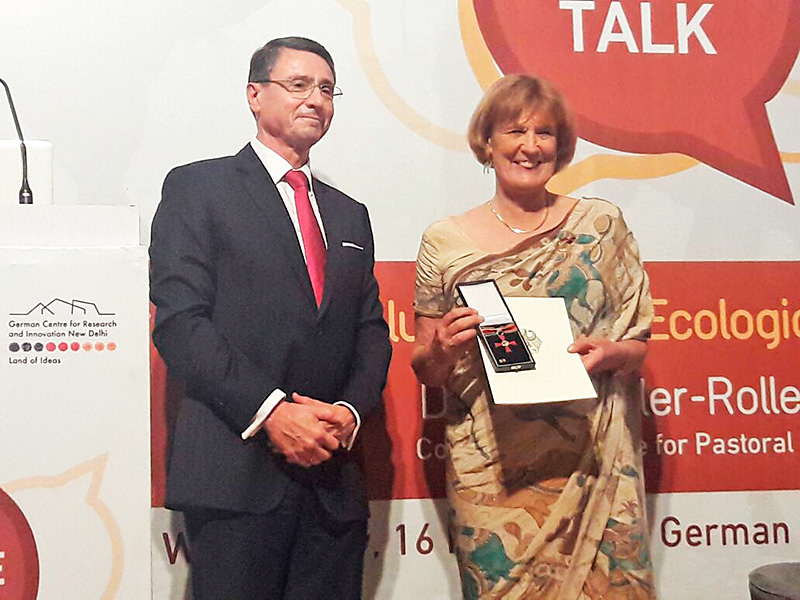‘Cross of the Order of Merit’ on Dr. Köhler-Rollefson
The German Ambassador to India, Dr. Martin Ney, conferred the prestigious German ‘Cross of the Order of Merit’, on Dr. Ilse Köhler-Rollefson at the German Embassy on 16th May.
Before the ceremony a Science Talk on ‘Pastoralism: A Blueprint for Ecological Animal Husbandry’ by Dr. Köhler-Rollefson took place. Dr. Köhler-Rollefson explained that from both an ecological and economic perspective pastoralism has many advantages over intensive animal husbandry causing water soil and air pollution, which has led to dangerous levels of antibiotic resistance and is burdened with animal welfare issues.
Read more:
https://india.diplo.de/Pastoralists Success Stories (Archive)
Institution and Capacity Building for Biocultural Protocols by livestock keeping communities
This project, supported by Misereor is proceeding the previous project “Creating a more level playing field for small-scale livestock keepers through the promotion of BCPs and Access and Benefit Sharing as well as inputs to GASL”, described below.
The overall goal of this project is to “mainstream” Biocultural Community Protocols (BCPs) as a tool for pastoralist and other livestock keeping communities to document their role in both biodiversity conservation and food production and thereby make visible their importance to policy makers.
One of the project objectives is to refine the methodology for BCPs and to establish standards that communities and support NGOs can refer to. For that purpose a manual on BCP will be put together based on the results of a workshop with BCP practioners, community leaders and UN representatives. In addition Training and Capacity Building workshops are planned to enable more communities to establish BCPs. Furthermore the discussion with UN Organizations (CGRFA at FAO, CBD Secretariat and others) about the institutional framework for BCPs will be initiated to highlight also their legal meaning.
Creating a more level playing field for small-scale livestock keepers through the promotion of Biocultural Protocols and Access and Benefit-Sharing, as well as inputs to GASL
The overall goal of the project is to shape and leverage emerging policy frameworks for livestock sustainability and for biodiversity conservation to the benefit of small-scale livestock keepers. GASL (Global Agenda of Action for Sustainable Livestock) and similar initiatives adopt a more holistic view of sustainability and integrate issues such as livelihoods and biodiversity into their sustainability assessments. The emerging discussion on Access and Benefit-Sharing for animal genetic resources shall be influenced in favour of Livestock Keepers’ Rights for biodiversity conserving livestock keepers.
By developing Biocultural Community Protocols (BCPs) communities claim Livestock Keepers’ Rights under the CBD (Convention on Biological Diversity) and the Nagoya Protocol.
This project is supported by Misereor.
The Ark of Livestock Diversity
This exciting new project has the full name “From Biocultural Protocols to the Ark of Livestock Biodiversity”. It is supported by the Fondation d’entreprise Hermes. Starting in July, 2011, the objective is to build on the existing Biocultural Community Protocols of three pastoralist communities in India, Pakistan and Kenya and to examine the scope for developing a special brand or label that indicates to consumers that a product is from a locally adapted livestock breeds and derives from biodiversity conserving production systems (“Ark of livestock biodiversity”).
We will use participatory community surveys to identify and document traditional livestock products and processing methods, analyse the special properties of these products in terms of sensory qualities, nutritional value, and medicinal effects in collaboration with scientists and share the results with communities, private enterprise and policy makers.
Expected results include an inventory of existing traditional products and processing methods from the selected pastoral communities, an analysis of the potential of local breeds for specialty products and evaluation of their health, heritage and sensory values, better understanding of the technological requirements for producing products tailored to urban consumer preferences, awareness among communities, policy makers and private enterprise about the economic opportunities inherent in local breeds, as well as insights into the potential and promise of and criteria for a special label/brand for products from biodiversity conserving livestock systems.
Lobbying and Capacity-building for the Implementation of International Legal Frameworks Relating to Biodiversity Conserving Livestock Keepers
This project has several objectives: To highlight the role of pastoralists and indigenous livestock keepers in biodiversity conservation, to build the capacity of our partners and other interested NGOS in undertaking breed documentation and Biocultural Protocols, and to strengthen African and Asian LIFE Networks. Some of the specific activities included participation in the 10th Conference of the Parties to the Convention on Biological Diversity in Nagoya (Japan), preparatory and capacity-building workshops, inputs to policy processes at the FAO’s Commission on Genetic Resources for Food and Agriculture (CGRFA), as well as various publications and articles. A two-day event for introducing Biocultural Community protocols for livestock keepers to communities, policy makers, and donors is planned for 28th – 30th November in Nairobi.
Ark of Livestock Diversity Flyer
Camel milk dairy – ready to start!
The microdiary project the Kumbhalgarh Camel Dairy, was set up in 2015. It is using milk from areas where the camels graze on plants traditionally recognized as having medicinal properties. The milk is collected daily from registered and monitored herds; as soon as it arrives in the dairy it is pasteurized then frozen for transportation to customers in Delhi and metros.
With great support of LPP members and friends the building of the camel diary was built at the LPPS Camel Conservation Centre near Ranakpur, Rajasthan. The machines for pasteurization and cooling where bought and installed. And now India’s first microdiary started to sell camel milk.

- Go to the previous page
- 1
- …
- 11
- 12
- 13
- 14
- 15
- 16
- 17
- …
- 82
- Go to the next page

